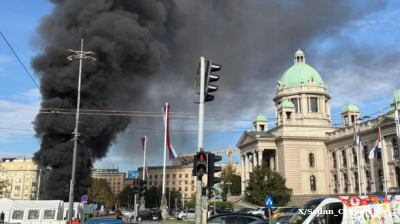From the very moment the Budapest summit was announced, it was clear that "many actors would do everything possible to prevent the summit from taking place," Hungarian Foreign Minister Peter Szijjarto told Telex.hu in an interview on October 21.
Hungary’s chief diplomat, currently in Washington, made the comment in response to an announcement by the White House that it suspended plans for a meeting between President Donald Trump and Russian President Vladimir Putin in Budapest, trying to downplay the diplomatic setback.
Szijjártó described the situation as "typical media and political manoeuvring" ahead of decisions affecting war and peace. Earlier this week, reacting to Kyiv’s observation that Budapest is not the most fitting venue for the talks, Szijjarto struck back that many will do everything they can to prevent a peace summit in Budapest and to block any chance of peace.
Hungary’s chief diplomat will hold talks on October 22 with US Secretary of State Marco Rubio.
Government sources and officials emphasised Budapest’s readiness to accommodate the talks, signalling Hungary’s willingness to facilitate dialogue in the conflict and portraying the country as a constructive, influential actor. From the moment Budapest was named as the venue, the government has tried to leverage the political repercussions ahead of the 2026 election.
The prime minister, seen as Putin’s close ally in the EU, portrayed the EU and its leaders as supporting the war by providing military and financial aid to Ukraine, while portraying his government as a pro-peace actor, which critics have said was merely a cover for supporting Russia’s goal in the conflict.
Successfully hosting the summit would have significantly bolstered Prime Minister Viktor Orbán’s personal prestige and political influence, both domestically and on the international stage, positioning him as a key diplomatic actor capable of facilitating high-stakes negotiations between global powers. So far Orban has not responded to the latest developments.
The planned peace talks in Budapest have collapsed, despite hopes following last week’s Trump-Putin phone call, wrote security analyst Peter Tarjanyi in a social media post. Washington expected concrete proposals, which Moscow failed to deliver, suggesting its aim was merely to buy time, or to prevent Ukraine from receiving the Tomahawk missile systems, he added.
Budapest could have been a suitable venue if genuine peace negotiations were the goal, but that was not the case, according to the analyst, who wrote that Russia’s tactics of buying time in the conflict are becoming increasingly evident.
News

Serbian president calls fire, shooting outside parliament a terrorist attack
The attacker, a retired employee of the former State Security Service, opened fire on a tent settlement of pro-government supporters.

Bolivia's new leader must rebuild a shattered economy
Bolivia enters a new political and economic phase as centrist Rodrigo Paz prepares to take office on November 8, inheriting one of the country’s most acute crises since the hyperinflation of the 1980s.

Central Asian states registering impressive trade gains
Success despite the lack of access to a seaport.

MOL says no risk to domestic fuel supply after Danube refinery blaze
Fires broke out at refineries in both Hungary and Romania in recent days.




